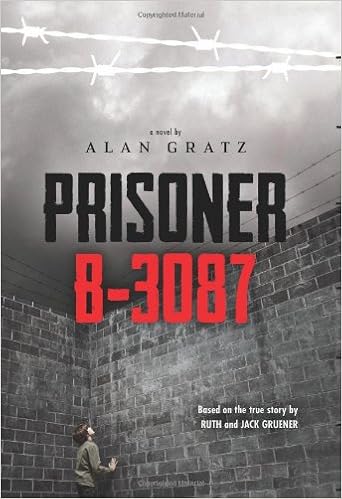This fictionalized account of Yanek, who was a boy of ten when the Nazis invaded Poland and took over their town of Plaszow, Krakow. He survived living in the Jewish ghetto and has his bar mitzvah in a secret warehouse with a small group of men. Soon after he was sent to his first of ten concentration camps.
"The red armbands belonged to political prisoners. Green meant criminals. Black armbands were worn by gypsies, though there were very few of those, as they were usually killed straight off. Purple meant Jehovah's Witness. Homosexuals wore pink. And all of them had a little letter in their triangle to tell you where they were from: P meant Polen, or "Pole"; T menat Tschechen or "Czech"; J meant Jugoslawen, or "Yugoslavian". There was no letter for the Jewish stars though. No matter where we had come from, we had no country. We were only Jews."
He meets the only member of his family left, his Uncle Moshe, who tells him he no longer has a name, to not give the Nazis any reason to notice him, and to think only of himself and that will be the way he will survive. This first camp was run by Amon Goeth, who couldn't eat breakfast without first killing a Jew. Every day the Jews kept track of how many he had killed that day: Goeth 19, Jews nil. He often sicced his dogs on prisoners that ripped them to pieces, in a horrid death.
In the camps he strived not to become a Muselmann, one who could barely get up or eat, the way they dragged their feet when they walked and breathed through their mouths in difficult ways. Muselmanns were the ones that were the walking dead.
He worked in the famous salt mines of Wieliczka, where hundreds of years ago miners carved out salt statues and an alter and vestry for Catholics. He tried hard to get special jobs, to avoid the hard labor of breaking stones, that killed so many.
Yanek not only survived 10 concentration camps, but also two death marches in the frigid snow. Each concentration camp was bad, but each was horrid in its own way. But no matter what they did to the Jews (torturing, killing) they had role call every morning and night, because the efficient Germans insisted on counting them. He would get his tattoo at Birkenau in 1944, marking him for life. However, no matter what the Nazis did to him, he survived the hell of the war and would be rescued by the Americans in 1945. This is technically a Young Adult book, but like most YA novels, can be enjoyed by an adult. This was a harrowing and amazing book of bravery and the power of the human spirit to not be extinguished.
Quotes
Life is but a river. It has no beginning, no middle, no end. All we are, all we are worth, is what we do while we float upon it—how we treat our fellow man. Remember this, and a good man you will be.---Alan Gratz (Prisoner B-3087 p 46-7)
Link to Amazon: http://www.amazon.com/Prisoner-B-3087-Ruth-Gruener/dp/054545901X/ref=sr_1_1?s=books&ie=UTF8&qid=1460558976&sr=1-1&keywords=prisoner+b-3087+by+alan+gratz


OK bOoMeR BuNcH.
ReplyDelete